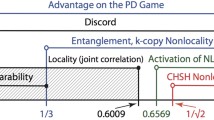Abstract
A pseudo-telepathy game is a game for two or more players for which there is no classical winning strategy, but there is a winning strategy based on sharing quantum entanglement by the players. Since it is generally very hard to perfectly implement a quantum winning strategy for a pseudo-telepathy game, quantum players are almost certain to make errors even though they use a winning strategy. After introducing a model for pseudo-telepathy games, we investigate the impact of erroneously performed unitary transformations and also of noisy measurement devices on the quantum winning strategy for the magic square game. The question of how strong both types of noise can be so that quantum players would still be better than classical ones is also dealt with.
Similar content being viewed by others
References
Aravind, P.K.: A simple demonstration of Bell’s theorem involving two observers and no probabilities or inequalities. http://arxiv.org/abs/quant-ph/0206070
Aravind P.K.: Bell’s theorem without inequalities and only two distant observers. Found. Phys. Lett. 15(4), 197–405 (2002)
Barenco A., Bennett C.H., Cleve R., DiVincenzo D.P., Margolus N., Shor P., Sleator T., Smolin J.A., Weinfurter H.: Elementary gates for quantum computation. Phys. Rev. A 52(5), 3457–3467 (1995)
Brassard G., Broadbent A., Tapp A.: Quantum pseudo-telepathy. Found. Phys. 35(11), 1877–1907 (2005)
Brassard B., Broadbent A., Tapp A.: Recasting Mermin’s multi-player game into the framework of pseudo-telepathy. Quantum Inf. Comput. 5(7), 538–550 (2005)
Brassard G., Cleve R., Tapp A.: The cost of exactly simulating quantum entanglement with classical communication. Phys. Rev. Let. 83(9), 1874–1877 (1999)
Broadbent, A.: Quantum Pseudo-Telepathy Games. M.Sc. thesis, Universit de Montral, 2004. http://www.iro.umontreal.ca/~broadbea/Publications/AnneMemoireFinal.pdf
Buhrman H., Hoyer P., Massar S., Roehrig H.: Combinatorics and quantum nonlocality. Phys. Rev. Lett. 91(4), 047903 (2003)
Fialík, I.: Pseudo-Telepathy Games. Ph.D. thesis (submitted), Masaryk University Brno (2011)
Fialík I.: Unitary noise and the Mermin-GHZ game. Electron. Proc. Theor. Comput. Sci. 25, 188–198 (2010)
Gawron P., Miszczak J.A., Sladkowski J.: Noise effects in quantum magic squares game. Int. J. Quantum Inf. 6(1), 667–673 (2008)
Nielsen M., Chuang I.L.: Quantum Computation and Quantum Information. Cambridge University Press, Cambridge (2000)
Yao, A. C-C.: Some complexity questions related to distributive computing. In: Proceedings of the 11th annual ACM symposium on theory of computing, pp. 209–213, ACM Press (1979)
Author information
Authors and Affiliations
Corresponding author
Rights and permissions
About this article
Cite this article
Fialík, I. Noise and the magic square game. Quantum Inf Process 11, 411–429 (2012). https://doi.org/10.1007/s11128-011-0254-x
Received:
Accepted:
Published:
Issue Date:
DOI: https://doi.org/10.1007/s11128-011-0254-x




